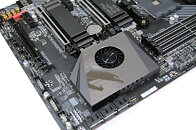Tuesday, March 9th 2021

AMD Acknowledges USB Connectivity Issues on 500 Series Chipset Motherboards
Users have recently been reporting various intermittent USB connectivity errors on AMD 500 series motherboards. AMD has acknowledged these issues in a recent Reddit post where they have asked affected users for more information to help them resolve the issues. The issues appear to be most commonly found when using VR headsets on X570 motherboards where intermittent connectivity issues are most noticeable. Some of the affected users report that the issues are most common when using a PCIe 4.0 GPU and that switching to PCIe 3.0 can sometimes resolve the issue. AMD is asking affected users to submit reports through their Online Service Request platform and will also contact users directly on Reddit to request detailed information.
Update Mar 9th:
AMD has provided some official guidance for affected users asking them to follow the solutions provided by Reddit such as disabling global C-States and switching to PCIe 3.0 mode if general troubleshooting has failed. AMD has reaffirmed that they were aware of the issue and that their engineers are actively working on a fix.
Source:
AMD
Update Mar 9th:
AMD has provided some official guidance for affected users asking them to follow the solutions provided by Reddit such as disabling global C-States and switching to PCIe 3.0 mode if general troubleshooting has failed. AMD has reaffirmed that they were aware of the issue and that their engineers are actively working on a fix.


52 Comments on AMD Acknowledges USB Connectivity Issues on 500 Series Chipset Motherboards
Lots of weird stuff happens when memory is off mostly when BLCK frequency oc'ing is overdone.
not to mention B550 boards are expensive like ryzen 5000 series and almost nostock for the processor.
the best budget option is to get b450 +r5 3600 i suppose
liar !!!!
everebody knows who are amd buyer .... god help them !!!
Eventually fixed it by refunding everything as i had WHEA crashes on factory default settings anyways.
Too much speculation, not enough details.
No issues at all, even with my new Oculus Rift S plugged in playing HL Alyx at ultra fidelity.
My "unreliable" AMD products have yet to give me any problems as opposed to the ones I had on Intel, but corporate fanboys gotta find a way to be a corporate fanboy in any thread huh.ASUS is the one motherboard manufacturer I never had any problems with lol
What about you?
Are you running the Zen 2 in your profile, or a Zen 3. Did this problem appear recently?If it's reliably reproducible on one OS and not in another (assuming you tested long enough), then it's very likely a software problem, either driver and/or OS.
I'm a little curious, the USB port that didn't work in Win10, did it work in Linux?Anything that happens when overclocking is self-inflicted.
Just because a machine passes hours of memtest and prime95, doesn't mean it's actually stable. Different workloads will stress different parts of the CPU and cause different timing issues.
After uninstalling some security update, Windows now detecting my phone. Clearly this is software problem.
At first I thought it was being caused by Corsair ST100 USB hub or the USBC hub that I also had connected but that turned out not to be the situation after I left them disconnected for awhile.
Fairly recently I tested with heavy use of a USB drive when this USB issue started to be reported, and it caused all my USB to disconnect. So I think this may not be limited to 500 series chipsets.
For me this USB problem seemed to creep in somewhere between
AMD AGESA Combo-AM4 1.0.0.4 Patch B ( with amd_chipset_software_2.04.28.626.exe, 2020-06-07 )
and
AMD AGESA Combo-AM4 PI 1.0.0.6 ( with amd_chipset_software_2.13.27.501.exe, 2021-02-18 )
Maybe this is useful info for those who have bios flashback and can rollback their system for troubleshooting if your're having a problem.
Otherwise, even if the guilty party (AMD/Intel/Realtek) doesn't fess up, it'd be nice just get an official acknowledgement of those issues. Be a long time coming.
It's interesting to see what kind of threshold people find acceptable for stability. For me, I expect a computer to run non-stop and without any need for reboots for at least three months at the time, I generally just reboot for critical kernel updates.If I may add; there is a simple way to block Windows update: disable updates on metered connections, and set your network connection as metered. ;)
e.g. removing a stick, win says its gone, but still shows the icon in taskbar,
until shutdown/reboot.
going from rfc 285 to 290/from IF1900 to 1800 etc, made it stop.
@efikkan
hope its a server or workstation (that has 24/7 load). otherwise your wasting power for nothing.
completely ignoring that just because something is running for 3 months continuously, doesnt mean much regarding stability.
www.phoronix.com/scan.php?page=news_item&px=AMD-PSF-Security-Analysis